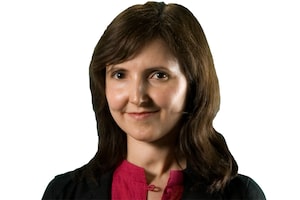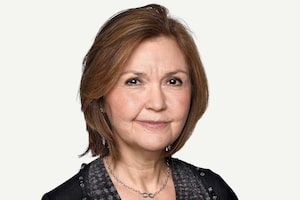The ongoing construction project at Bloor and Dufferin at the site of the old Bloor Collegiate Institute in Toronto is an example of an ongoing Toronto Lands Corp. project to leverage prime real estate to the benefit of the public education system.Duane Cole/The Globe and Mail
The Toronto District School Board’s real estate subsidiary met provincial government officials without the full board’s approval, pursued its own independent goals and attempted to circumvent executive pay freeze legislation, leaving the two organizations in a dysfunctional relationship, according to a confidential report.
Officials at the TDSB and Toronto Lands Corporation – which manages the board’s $20-billion real estate portfolio – have clashed repeatedly for years, leading to “tension and distrust,” “many conflicts and inefficiencies” and a growing “misalignment,” says the September, 2022, report obtained by The Globe and Mail.
The TDSB is one of the largest landowners in Toronto, with more than 600 schools and other properties. Toronto Lands, which was founded in 2008 and is unique in Canada, raises funds to repair aging schools through property sales. It also handles leases and land-use planning.
The revelations in the report have surfaced at a critical time, as Ontario Premier Doug Ford’s government sets its sights on using surplus school lands to ease the province’s housing crisis with new legislation, Bill 98. The province’s move raises questions about how much input boards will have when it comes to selling off valuable property.
It also shows how housing shortages are forcing elected officials to consider new frontiers – including the redevelopment of public land that, only a few years ago, would have been too politically fraught to touch.
The wide-ranging bill was crafted to give the province broad powers to direct the sale of excess school property. Currently, school boards control such transactions.
Several school boards, including the TDSB, have spoken out against the government’s plans, saying the legislation would curtail the ability of trustees to respond to the needs of their communities, including future population growth.
But as the TDSB pushes back against the initiative, a Globe investigation has found that the management of the board’s most valuable asset – land – has been mired in chaos. Interviews with a dozen insiders, including current and former officials with the board and the province, as well as a review of confidential, internal TDSB documents, show the board has struggled to get its house in order.
The confidential report, a 76-page performance review that was commissioned by the TDSB last year and conducted by the Bay Street law firm Dentons, found fault with both Toronto Lands and the TDSB in multiple areas, notably a lack of clarity around roles and responsibilities.
The review singled out Toronto Lands for meeting with provincial officials without the full knowledge or approval of the board of trustees. The report found the organization “demonstrated a fundamental disrespect” for its role as a subsidiary in trying to evade a legislated pay freeze for public-sector executives.
It also said Toronto Lands pursued policy goals independent of the TDSB and has “exceeded its authority” on occasions, although its work has been “very good.”
In response to the report, the board put Toronto Lands on a shorter leash, including by giving the TDSB a majority of seats on the subsidiary’s board of directors. Previously, a majority of Toronto Lands directors came from the private sector, many with experience in real estate and finance. Before the TDSB’s restructuring took effect, Toronto Lands’ citizen directors resigned en masse in January. The TDSB named new directors last month.
TDSB spokesperson Ryan Bird declined to comment on the Dentons report, noting that trustees discussed it during a private board meeting. But with the changes to Toronto Lands’ board, he said, the organization is “moving in a positive direction toward supporting the TDSB in providing modern and welcoming learning spaces for students.”
It is unclear, however, what role Toronto Lands will have in managing the TDSB’s real estate assets once Bill 98 comes into force. The bill passed third and final reading last month, but the government has yet to release regulations detailing how it will control school land sales.
In an interview with The Globe, Education Minister Stephen Lecce did not respond directly when asked if he envisions a role for Toronto Lands under the legislation.
“We are going to work with any and all willing partners who share our ambition and, frankly, who share our determination to build schools faster,” he said.
Alex Bozikovic: TDSB has a huge amount of real estate and a plan to fix it. But is it adequate?
The end runs
Tensions between the TDSB and Toronto Lands boiled over last year after a meeting between Mr. Lecce’s top bureaucrat and representatives of the two organizations about an ambitious plan to redevelop underused school lands.
The March 4, 2022, meeting was arranged by Alexander Brown, who was the chair of the TDSB at the time, and attended by the board’s vice-chair and some staff, according to three sources. Mr. Brown also invited Toronto Lands chief executive officer Daryl Sage. The Globe is not identifying some of the dozen insiders so they could speak freely about private discussions; in other cases, the sources were not authorized to speak publicly on the matter.
However, the meeting became a sore point for several TDSB trustees, who didn’t know the gathering was taking place and believed the entire board should have approved it beforehand, according to six current and former board officials.
The Dentons investigators found that the entire board should have been notified about such high-stakes meetings.
“It is highly unusual in our experience for a public-sector subsidiary corporation to reach out to higher levels of government without the full support of the parent company, let alone its knowledge,” the report says.
During the meeting, Deputy Minister of Education Nancy Naylor requested a “further understanding” of Toronto Lands’ modernization strategy, according to the agenda for a later TDSB board meeting.
Toronto Lands’ modernization strategy focuses on “leveraging” and “maximizing” underused properties by selling them for redevelopment into community hubs, with facilities such as new schools, recreation centres, nursing homes and housing.
The corporation had developed the plan as a way for the TDSB to generate much-needed cash to upgrade schools – its repair backlog exceeds $4-billion – given provincial funding is limited. By redeveloping a range of sites – including vacant properties, surplus administration buildings and schools needing replacement – the board could raise an estimated $1-billion over a decade, Toronto Lands has said.
In one recent example, severing part of a site at Bloor Street West and Dufferin Street generated a $151.5-million windfall for the TDSB. The area is being turned into a community hub, with housing as well as a high school, daycare and park.
But the way Toronto Lands developed and disseminated its modernization strategy – and its later discussions about the plan with the provincial government – further strained relations between the TDSB and its subsidiary, the Dentons review found. The ambitious plan should have been more clearly presented to trustees, the report says.
The first public mention of the modernization strategy took place at a TDSB board meeting in June, 2021, when Mr. Sage presented Toronto Lands’ 2021-22 annual plan. He noted then that the strategy was in “the very early stages of thought,” but he offered little elaboration.
In the end, trustees approved Toronto Lands’ annual plan at the meeting, and the subsidiary took the position that, by doing so, the board also endorsed its modernization strategy.
The Dentons review took issue with this, saying, “Using the Annual Report to expand jurisdiction is not appropriate and does not validate it.”
Several months later, Toronto Lands’ modernization strategy again became a lightning rod for controversy after Mr. Sage presented it to officials at the Ministry of Education during the meeting in March, 2022.
The provincial bureaucrats were clearly interested in Toronto Lands’ modernization strategy, proposing a working group to develop a joint approach to funding the TDSB’s capital program for school repairs, according to the agenda for a later TDSB board meeting.
However, at another TDSB meeting a few months later, the board defeated a motion to set up the joint working group proposed by Christopher Mammoliti, who was then the board’s vice-chair and had attended the government meeting. Some trustees said they had felt blindsided by Toronto Lands’ ambitious plans.
Parthi Kandavel, a TDSB trustee and Toronto Lands board member at the time, said he was concerned that the subsidiary would sell off land on school sites with lots of green space in racialized, lower socio-economic neighbourhoods in parts of Scarborough and Etobicoke – where residents don’t have the resources to fight proposed property development.
“I have observed this lack of equity in discussions within the modernization strategy,” he said at the meeting, adding that “this flies against” the TDSB’s own multiyear strategic plan for school enrolment, which is centred on including the voices of people in low-income communities.
Mr. Mammoliti said in an interview that he blames himself for not giving his colleagues enough time to fully understand the presentation Toronto Lands made to Mr. Lecce’s officials. He said a communications gap was the reason not all trustees knew about the meeting.
The same month the TDSB board voted against Mr. Mammoliti’s motion to set up the working group with the government, it awarded a sole-sourced contract to Dentons to conduct its review at an estimated cost of $85,000.
Culture clash
Directors on Toronto Lands’ board come from two different worlds, often resulting in a clash of cultures.
“TLC has developed an assertive and fast-paced corporate culture reflective of the private sector and believes it is hamstrung by the TDSB corporate culture, which it sees as bogged down in bureaucracy,” the Dentons report says.
Those competing world views played out in recent years over repeated efforts by Toronto Lands’ board of directors to increase Mr. Sage’s salary despite an Ontario government freeze on public-sector executive compensation. Mr. Sage earned roughly $227,000 last year, according to provincial records.
The efforts began in late 2018, when former Toronto mayor David Crombie, then-chairman of Toronto Lands, asked the TDSB if Mr. Sage’s pay could be increased. The board retained a law firm, which concluded that a salary bump was not allowable under the legislation, according to the Dentons report.
A few months later, “unsatisfied” with the legal opinion and without the knowledge or approval of the TDSB’s general counsel, Toronto Lands hired another law firm that suggested strategies to “circumvent” the statutory wage freeze, according to Dentons. One such strategy was adding chief operating officer to Mr. Sage’s responsibilities, providing him with “two roles and two salaries.”
The efforts to boost Mr. Sage’s pay appear to have been temporarily shelved after the TDSB’s general counsel wrote to Toronto Lands’ board in mid-2019 to say a salary increase was not permitted by law.
But the matter resurfaced in 2021, when Toronto Lands hired another law firm – the third to weigh in – which advised that the subsidiary was not subject to executive compensation legislation and could increase its CEO’s pay.
The matter was finally put to rest after the two organizations turned to the provincial government for a decision. The province said the board’s initial legal opinion was correct – that Toronto Lands is subject to the executive salary freeze.
“This is an example of where TLC stepped outside of its mandate to challenge the legal opinion” provided to Toronto Lands, the report says. “It also demonstrated a fundamental disrespect for its role as a subsidiary of a public corporation, the TDSB, and needlessly expended public funds to do so.”
Lingering uncertainty
Last October, the TDSB responded to the Dentons report at an in-camera board meeting, according to a confidential slide presentation obtained by The Globe.
Trustees changed the composition of Toronto Lands’ board of directors by giving the TDSB a majority of the board’s 10 seats – an increase to six from four – and reducing the number held by citizen directors to four. The recommendation was not included in the Dentons report.
The TDSB also recommended allowing a trustee to chair the board of Toronto Lands and transferring responsibility for human-resources matters governing the subsidiary’s CEO to the TDSB.
However, before the changes took effect, all six citizen board members of Toronto Lands resigned at the end of January, a move first reported by the Toronto Star. Those who stepped down included chair Brenda Patterson, a retired City of Toronto manager; Peter Gross, a lawyer who practices municipal law; and Doug Annand, a real estate consultant.
Last month, Toronto Lands issued a press release announcing that the TDSB had appointed four new citizen directors to its board, including former Toronto city councillor John Filion.
 Jill Mahoney
Jill Mahoney Karen Howlett
Karen Howlett Caroline Alphonso
Caroline Alphonso